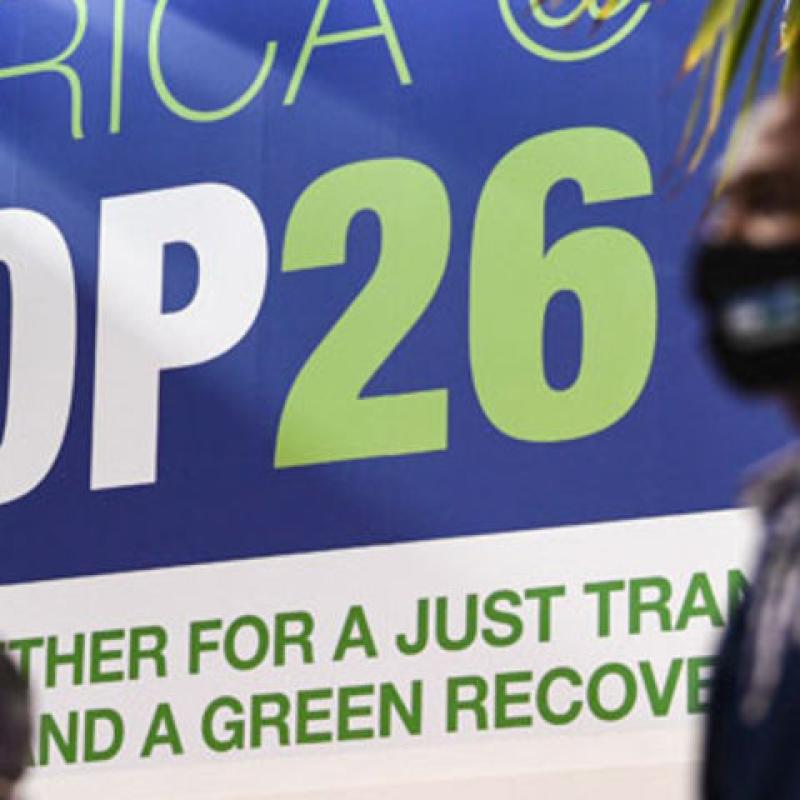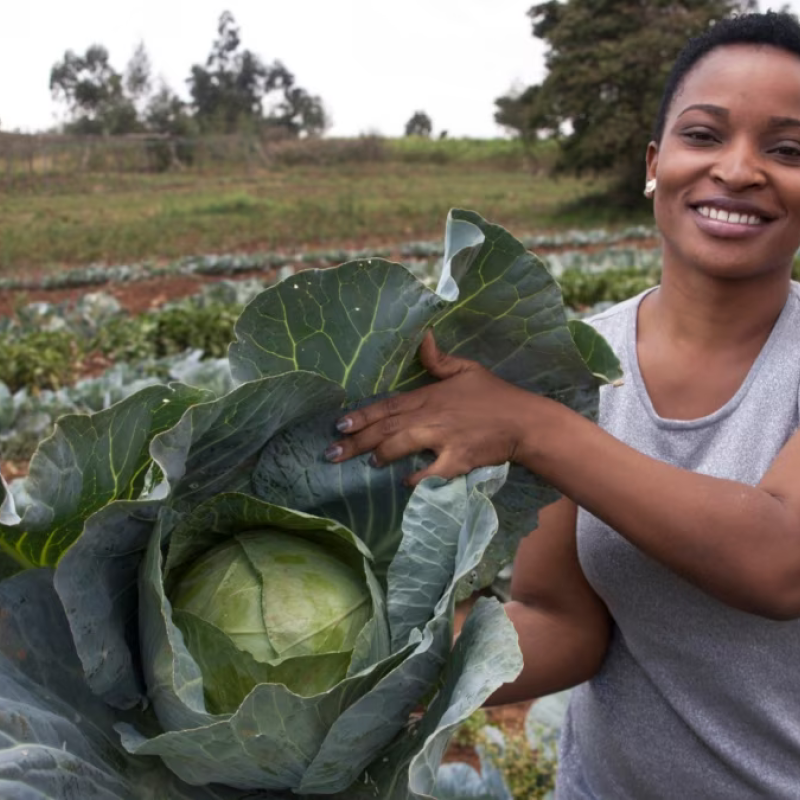
AAAP in the Media
Displaying 1 - 12 of 14
Digital Climate Adaptation Solutions Training – Southern Africa
Harnessing the power of technological innovations and digitalization to improve agricultural productivity and strengthen climate resilience has been recognized as one of the potential game changers to address many of pressing climate concerns and rural transformation challenges facing Africa today.
Digital climate-informed advisory services are tools and platforms that integrate climate information into agricultural decision-making. These services range from digital mobile apps, radio, and online platforms to digitally enabled printed bulletins based on climate models and extension services that utilize climate information platforms. DCAS offers crucial opportunities to build the resilience of small-scale producers in the face of worsening climate change impacts, particularly when bundled with complementary services (such as financing, input supply, market access, insurance).
The objectives of the DCAS trainings are as follows:
- Capacity enhancement for agricultural stakeholders across Southern Africa in DCAS
- Supporting trainees to improve their confidence and capacity to design and implement DCAS projects to reach the last mile and farmers for improved food security and climate resilience
- Facilitating knowledge/experience sharing of participants on contextual issues and approaches to scale up DCAS
- Increase the knowledge of stakeholders from across Southern Africa on opportunities and new approaches for the design, mainstreaming and use of digital tools and data-enabled agriculture to combat the effects of climate change
- enhancing capacity to use digital agriculture advisory services and solutions to ensure uptake by of DCAS among stakeholders in Southern Africa
- Over 50 Participants trained in digital agriculture and digital climate adaptation solutions
- A new cohort or platform of African public officials, researchers, farmers organizations leaders and agricultural NGO focal points with improved expertise in DCAS (for subsequent experience capitalization follow up and training)
- Training evaluation assessment report
- Improved understanding / knowledge of target stakeholders in Southern Africa through training and information sharing including lessons learned on the challenges, opportunities and new approaches to the design, mainstreaming and use of DCAS and data-enabled agriculture
- Enhanced capacity of selected agricultural stakeholders in public institutions and farmers groups across Southern Africa to use digital agriculture advisory solutions, implement digital climate smart advisory solutions, and train their members/colleagues to use DCAS tools
€100,000
Programme for Integrated Development and Adaptation to Climate Change in the Zambezi River Basin (PIDACC Zambezi)
Zambezi River Basin, in Southern Africa Region, has the largest drainage basin (1.4 million km2) with rich variety of natural resources, covering parts of eight riparian states namely Angola, Botswana, Malawi, Mozambique, Namibia, Tanzania, Zambia, and Zimbabwe. Despite this potential, riparian states are struggling to cope up with worsening ecological circumstances, environmental degradation, global warming, and climate change, which have created conditions of chronic vulnerability, food insecurity, and economic hardships
The objective of the project is to strengthen regional cooperation in building the resilience of the Zambezi River Basin communities to climatic and economic shocks, through promoting inclusive, transformative investments, job-creation, and ecosystem-based solutions.
- Identified climatic risks to major agricultural value chains and digital technologies that have the potential to accelerate climate adaptation in the Zambezi River Basin
- Prepared national profiles on digital adaptation in agriculture for the various countries of the Zambezi River Basin, a summary of the prevalent adaptation techniques among smallholder farmers, and the key institutional, policy and human capital challenges to digitization
- Actionable design and engagement opportunities, which will mainstream digital climate advisory services into the implementation of the PIDACC program
- Benefit about 800,000 (60% women and 10% youth) within hotspot areas, and indirectly the whole population
- Improved access to water, climate smart agricultural technologies, and community-level infrastructure for irrigation and markets
- Associated benefits include multi-sectoral utilization of shared water resources within the context of integrated land and water resources development and management, gender equality and social inclusion
- Strengthened institutional capacities and mechanisms for coordination of Basin monitoring, planning, and management
- Increased demand-driven community-level feasible climate resilient infrastructure that would support livelihoods
- Reinforced inclusive and diversified climate resilient livelihoods support through enhanced agribusiness and small & medium enterprises (SME) development
- Developed and improved livelihoods, including job creation by enhancing agribusiness through investments in water, sanitation, energy, human capital, and agriculture sectors
- Support adaptive capacity of communities with a view to avoid, reduce and reverse land degradation and effectively manage water
AfDB Investment of USD16.7 million of total USD19.4 Million
Staple Crops Processing Zone (SCPZ): funding proposal to the Green Climate Fund
The target countries of Democratic Republic of the Congo, Ethiopia, Togo and Zambia are regions experiencing high deforestation, poor agriculture yield and increasing poverty exacerbated by climate change. Across all four countries, climate variability and change has become a major threat to sustainable development.
As part of efforts to address these challenges, the four countries are implementing national projects to establish Staple Crops Processing Zones: initiatives designed to concentrate agro-processing activities within areas of high agricultural potential to boost productivity and integrate production, processing and marketing of selected commodities. These initiatives are purposely built shared facilities, to enable agricultural producers, processors, aggregators and distributors to operate in the same vicinity to reduce transaction costs and share business development services for increased productivity and competitiveness.
Developing adequate infrastructure (energy, water, roads, ICT) in rural areas of high agricultural potential should attract investments from private agro-industrialists/entrepreneurs to contribute to the economic and social development of rural areas.
The Staple Crops Processing Zone (SCPZ) development program aims to transform agriculture production in regions experiencing high deforestation, poor agriculture yield and increasing poverty exacerbated by climate change, including the target countries of Democratic Republic of the Congo, Ethiopia, Togo and Zambia.
The specific objectives of SCPZ are: (i) improving access to seed capital through grants and matching grants; (ii) supporting productivity enhancement through introduction of new technologies and agricultural inputs; (iii) improving access to infrastructure by supporting investment; (iv) improving the capacity of producer cooperative through training and TA, especially for targeted women and youth groups; (v) facilitating market linkages throughout-growers’ schemes; and (vi) facilitating on-farm value addition by targeting limited value chains and linking farmers to the supply chain.
GCF financing is sought to strengthen one of the project components of SCPZ in Democratic Republic of the Congo, Ethiopia, Togo and Zambia.
- Through the technical assistance program, AAAPwill accelerate the mobilization of adaptation finance.
- Increased carbon sinks in soil and above-ground biomass
- Reduced carbon dioxide/other greenhouse gas emissions from farms due to efficient energy use
- Increased renewable energy production from biomass, either as a substitute for fossil fuels or as a replacement for burning of fuel wood or crop residues
- Fewer incidents of bare soils, reduced soil erosion and increased water percolation.
- Reduced emissions through low-emission energy access and power generation
- Reduced emissions due to improved waste management, including by recycling waste and use of waste in biogas systems
- Reduction of emissions from land use and deforestation, and enhancement of forest carbon stocks.
-
Increased resilience, including to extreme events such as droughts and floods, and enhanced livelihood of about 55% of highly vulnerable people and communities
-
Increased access to better health and wellbeing, and food and water security to over 100,000 beneficiaries, in addition to provision of alternative sources of energy
-
Increased resilience of ecosystems and ecosystem services in forests and savannas
USD 427 million:
- Funding proposal to GCF seeking USD 174.02 million (USD 130.02 million grant and USD 44 million loan)
- AfDB providing USD 111.2 million (USD 85.2 million loan and USD 26 million grant)
- Co-financiers:
European Union, USD 10.4 million (grant)
BOAD, USD 17.6 million (loan)
Korea Exim Bank, USD 50 million (loan)
Korea Fund, USD 5 million (grant)
Islamic Development Bank, USD 31 million (loan)
Governments of target countries, USD 28 million (counterpart financing)
Climate risk regulation in Africa’s financial sector and related private sector initiatives
Extreme weather phenomena such as rising temperatures and the increasing frequency of droughts and floods are affecting lives and livelihoods in Africa. According to the Global Climate Risk Index 2021,1 five African countries ranked among the 10 countries most affected by extreme weather in 2019: Mozambique (first), Zimbabwe (second), Malawi (fifth), South Sudan (eighth), and Niger (ninth).
Direct Access Modality to access the Green Climate Fund
Africa is under-served by adaptation finance. Africa received USD 7.9 billion of an annual average of USD 46 billion in adaptation finance for 2019 and 2020. There is a large disparity between climate finance pledged, finance approved, and finance disbursed by the multilateral climate funds. As of January 2022, only 9.23% of global climate financing was earmarked for sub-Saharan Africa for adaptation purposes. Almost one third of the Green Climate Fund’s (GCF's) Direct Access Entities (DAEs) are in Africa, but only 11 out of 54 countries have at least one national accredited entity. DAEs are only accredited for projects with budgets below USD 50 million and are therefore limited in their ability to access funding for larger projects.
This project will develop a concept note as a starting point for a full funding proposal to the GCF. To achieve this, actions will include a desk review of national climate-related development strategies and reference documents in the target country; identification of a promising project idea, in close collaboration with relevant stakeholders; and facilitation of a consultative workshop to discuss the project’s rationale, main intervention areas and implementation arrangements.
Through the Technical Assistance Program (TAP), the Global Center on Adaptation (GCA) will accelerate the mobilization of adaptation finance. Through the direct access modality, GCA will enhance local capacity to formulate robust concept notes for funding consideration by the Green Climate Fund.
AAAP will support the climate risk assessment studies requested by the GCF.
- Four robust project/program concept notes and pipeline developed, for Burkina Faso, Democratic Republic of Congo, Niger and Nigeria.
- For the Democratic Republic of Congo, new sources of climate finance for adaptation and resilience investments identified.
- Development of a roadmap with key actions to prepare the full funding proposal, including the necessary complementary studies, the evaluation of the cost of these studies and the cost of the full funding proposal.
- Relevant initiatives or projects planned or underway and implemented in the project intervention areas
- Development of a portfolio of paradigm-shifting adaptation projects and programs, i.e., development of concept notes, supporting and enhancing funding proposals.
- Building capacities for adaptation finance planning, mobilization and implementation, i.e., Climate Public Expenditure Reviews.
- Direct Access strengthening with the aim to diversify and to increase the delivery channels, i.e., New Accreditation and Accreditation upgrades.
DRC: USD 58.75 million
Burkina Faso: USD 40 million
Niger: USD 50 million
Nigeria: USD 50 million
Total: USD 198.75 million
Global Center on Adaptation, AfDB host regional forum on the future of resilient food systems in Africa
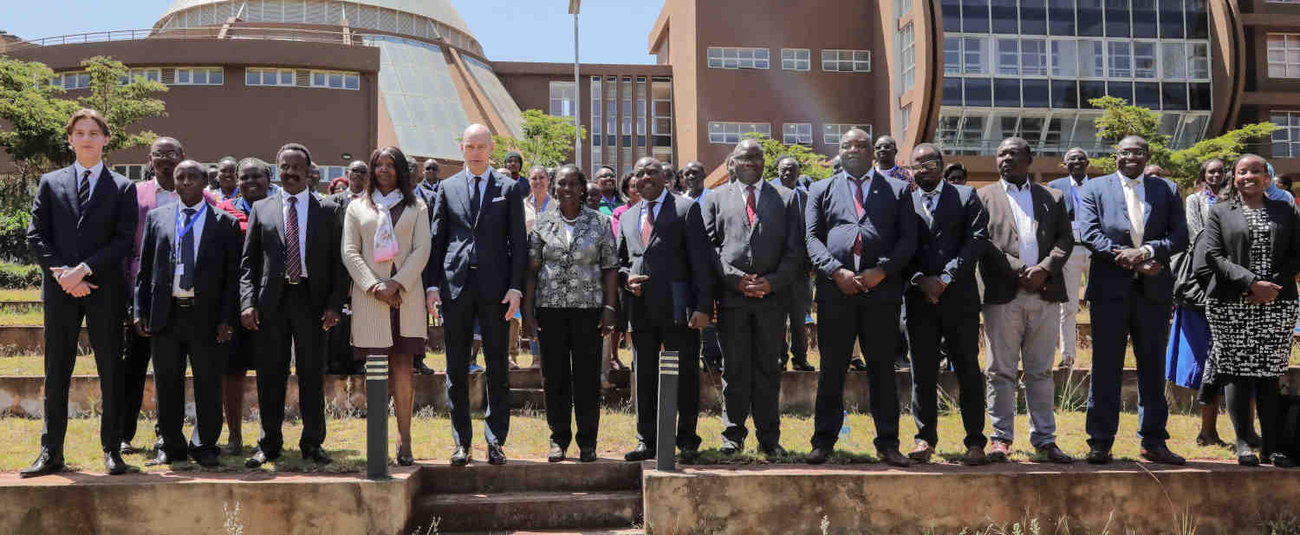
The Global Center on Adaptation (GCA) in collaboration with the African Development Bank and the Wangari Mathai Institute have concluded a three-day regional forum on the future of resilient food systems in Africa.
The Forum, called the Future of Resilient Food Systems in Africa – AAAP Digital Solutions for a Changing Climate provided training aimed at strengthening the capacity of stakeholders from across Eastern Africa to design and implement solutions to improve food security and climate resilience and to facilitate knowledge sharing among farmers on approaches to scale up the use of Digital climate-informed advisory services, or DCAS.
Digital climate-informed advisory services are tools and platforms that integrate climate information into agricultural decision-making. These services range from digital mobile apps, radio, and online platforms to digitally enabled printed bulletins based on climate models and extension services that utilize climate information platforms.
DCAS offers crucial opportunities to build the resilience of small-scale producers in the face of worsening climate change impacts. From seasonal forecasts to pest advisories, effectively designed services provide producers with the resources to adapt to climate shocks and plan for new climate conditions.
Globally, more than 300 million small-scale agricultural producers have limited or no access to such services because service provision is still fragmented, unsustainable beyond project cycles, and not reaching the last mile.
Speaking at the opening ceremony of the forum, Professor Patrick Verkooijen, CEO of Global Center on Adaptation called for urgent financial support to put Africa on the path of food sovereignty.
“Africa needs urgent support to scale up the implementation of adaptation solutions that are already yielding good results for irrigation, developing drought-resistant seeds, crops and livestock diversification, “ he said.
“Through the African Adaptation Acceleration Programme, AAAP, we are rolling out a $350 million project to build resilience for food and nutrition security in the Horn of Africa towards mobilising new digital climate technology for market information, insurance products, financial services that can and must be tailored to smallholder farmers’ needs”, he added.
Speaking on behalf of the African Development Bank’s East Africa Regional Director General, Nnenna Nwabufo, Dr Pascal Sanginga, Regional Sector Manager for Agriculture and Agro-Industries noted that the forum was timely, coming hot on the heels of the recently concluded Dakar 2 Feed Africa-Food Sovereignty and Resilience summit , organised by the African Development Bank.
“The Africa Adaptation Acceleration Program (AAAP) is already contributing to closing Africa’s adaptation gap by supporting African countries to make a transformational shift in their development pathways by putting climate adaptation and resilience at the center of their policies, programs, and institutions. There is no doubt that AAAP will be a strong component of the Country Food and Agricultural Delivery Compacts to accelerate the transformation of Africa’s food systems and build a more resilient Africa”, he said.
Professor Stephen Kiama Gitahi, Vice Chancellor of the University of Nairobi, reiterated the relevance of the forum pointing out that 70% of the population in Eastern Africa live in rural areas and depend on agriculture for their livelihoods. He encouraged the trainers to simplify the modules in a manner that removes the fear for technology and accelerate adaptation for rural farmers. Citing the legacy of late Professor Wangari Maathai he stated:
“We acknowledge that gaps exist on climate adaptation in the rural communities and those can be smartly bridged with the use of digital smart agriculture and climate innovations to create great conservation impact in our region.”
The forum brought together stakeholders from ministries of agriculture, related government agencies, public research institutions, farmer organizations, universities and non-profit organizations working on climate adaptation for food security in Eastern Africa. These included participants from Djibouti, Eritrea, South Sudan, Burundi, Rwanda, Mauritius, Tanzania, Seychelles, Sudan, Ethiopia, Rwanda and Kenya.
About Global Center on Adaptation
The Global Center on Adaptation (GCA) is an international organization which works as a solutions broker to accelerate action and support for adaptation solutions, from the international to the local, in partnership with the public and private sector. Founded in 2018, GCA operates from its headquarters in the largest floating office in the world, located in Rotterdam, the Netherlands. GCA has a worldwide network of regional offices in Abidjan, Cote d’Ivoire; Dhaka, Bangladesh and Beijing, China.
About the Wangari Maathai Institute, University of Nairobi
The Wangari Maathai Institute (WMI) for peace and environmental studies is a global centre for teaching and research on environmental management, governance, peace and conflicts and the nexus between peace and democracy. The centre was founded in 2009 with the support of the Government of Kenya (GoK), the African Union(AU) and the African Development Bank(AfDB) to celebrate and immortalize the work of the late Nobel Laurete
Prof.Wangari Maathai who was a global champion on environmental conservation and governance. The centre trains future leaders and Champions for environment. The Centre is located in the serene environment in Upper Kabete suburb of Nairobi City.
UK gives Africa $197 million to mitigate climate change
Youth Adaptation Solutions Challenge Francophone Cohort
The Youth Adaptation Solutions Challenge is an annual competition and awards program for youth-led enterprises (50% women-led) organized by GCA and AfDB as part of the Youth Adapt Flagship Program.
The competition invites young entrepreneurs and Micro, Small and Medium-sized Enterprises in Africa to submit innovative solutions on climate adaptation and resilience. The winners will be part of a 1-year incubator program, which will provide tailored training on business development and adaptation, coaching, networking opportunities, and grants to enable the youth-led enterprises to scale up their innovative businesses and build resilience among marginalized communities in Africa
The objective of the project is to deliver business development services (BDS) to and build the institutional capacity of youth-led enterprises, positioning them to effectively utilize grants offered and to also mobilize additional private capital, scale up climate action and create employment opportunities on the continent.
- Build youth capacity for employability and unlocking access to finance
- Deliver a 1-year incubator program tailored training on business development and adaptation
- Provide coaching and networking opportunities
- Equip young innovators and MSMEs with customized skills and resources to scale up climate adaptation innovations and boost the creation of jobs
- Grant disbursement to the 5 winners of the YouthADAPT winners
- 12-weeks training with practical skills in entrepreneurship and business development and climate adaptation
- Mentorship to enable the winners to execute their business plans, create jobs, and support the continental effort towards climate resilience
- Training materials developed and training workshops delivered tailored to the selected youth-led start-ups
- Support to the youth led-businesses to develop and implement their business plans and to mainstream adaptation and climate resilience in their businesses
- Delivered business development services (BDS) to and building the institutional capacity of youth-led enterprises
- Youth-led enterprises positioned to effectively utilize grants offered and to also mobilize additional private capital
- Scaled up climate action and ability create employment opportunities on the continent
USD 500 Million
African, other world leaders gather for largest summit on climate adaptation at COP26
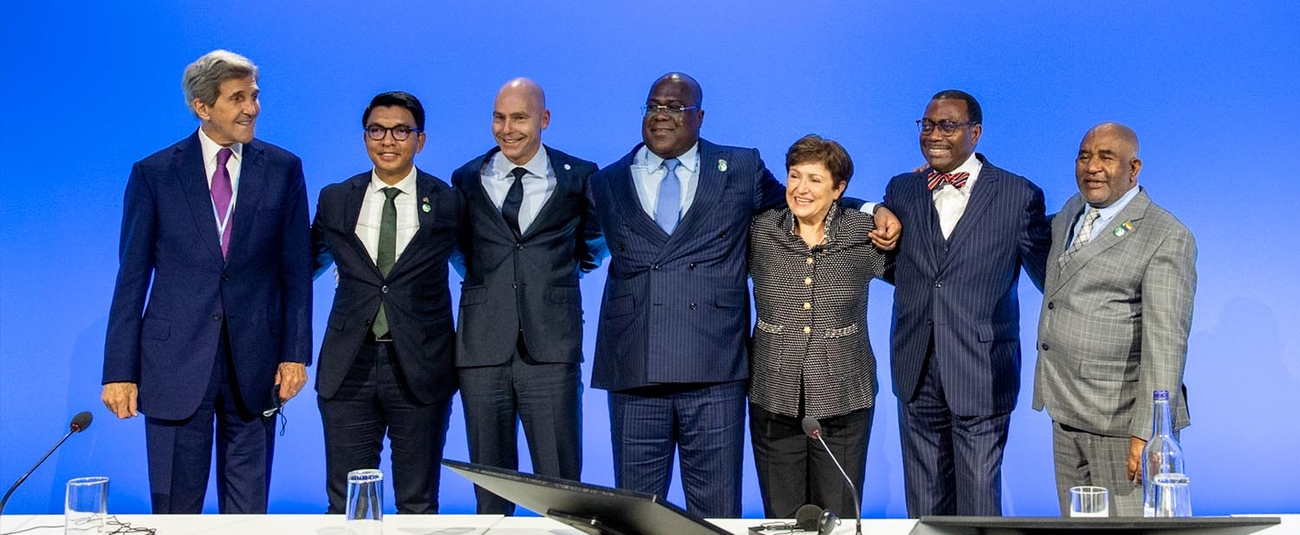
African and other global leaders came together at COP26 in Glasgow yesterday for the Africa Adaptation Acceleration Summit, the largest summit to date on climate adaptation.
The summit called for the rest of the world to ramp up its support for the African continent as it adapts to the adverse effects of climate change, including devastating human impacts in Madagascar, where 1.3 million people live under food distress following four years of no rain. Madagascar’s situation has been described as the first climate induced drought.
President Félix Tshisekedi of the Democratic Republic of Congo and Chairperson of the African Union led Tuesday’s event. He highlighted the $6 billion in financial commitments for climate adaptation that African countries had put forward in their nationally determined contributions (NDCs) and called for increased funding to produce the additional $27 billion a year that the continent requires.
President Tshisekedi said: “Adaptation finance flowing to Africa is grossly insufficient compared to the enormous resources needed for the continent to adapt to climate change. That is why African countries, working with the Global Center on Adaptation, the African Development Bank, and other partners, launched the Africa Adaptation Acceleration Program (AAAP). The program lies at the heart of Africa’s climate change needs. It is Africa-owned and Africa-led. African nations have endorsed it as Africa’s preferred mechanism to deploy adaptation finance for adaptation projects in Africa.”
African Development Bank Group President Dr Akinwumi A. Adesina said: “The Africa Adaptation Acceleration Program is a game changer for Africa to deliver results and impacts on adaptation, fast and at scale. It will support 30 million farmers with digital climate advisory services. The Technologies for African Agricultural Transformation program supported by the African Development Bank and the Bill and Melinda Gates Foundation has already delivered climate resilient technologies for 11.2 million farmers in just two years.”
He added: “With the Africa Adaptation Acceleration Program, we expect to reach 40 million farmers. We plan to support farmers in producing 100 million metric tons of food, which will be enough to feed 200 million people and reduce hunger by 80%.”
Moderating summit proceedings, Patrick Verkooijen, CEO of the Global Center on Adaptation, underscored the urgent need for accelerated climate adaptation action across the continent: “COP26 must deliver on the promises of Paris,” he said. “We are failing and we are failing Africa. We must bring more ambition and more finance to help Africa adapt to the pace of a climate emergency devastating the continent with increasingly serious consequences for the world’s poorest and most vulnerable,” the GCA CEO added.
COP26 President Alok Sharma announced $197 million in new funding for adaptation for Africa from the UK government. Of this amount, $27 million will support the Africa Adaptation Accelerated Program upstream facility to deliver technical assistance and a pipeline of bankable projects. The package is expected to unlock almost $1.2 billion for climate adaptation in Africa. Sharma said there will be more to come.
US Secretary of State Antony Blinken also announced new funding for climate adaptation from the United States government. He said the US President would work with the US Congress to dedicate $3 billion annually in adaptation finance by the year 2024. This is the largest commitment ever made by the US to reduce the impact of climate change in those most endangered by it around the world.
African presidents and global leaders support bold action on climate change adaptation for Africa
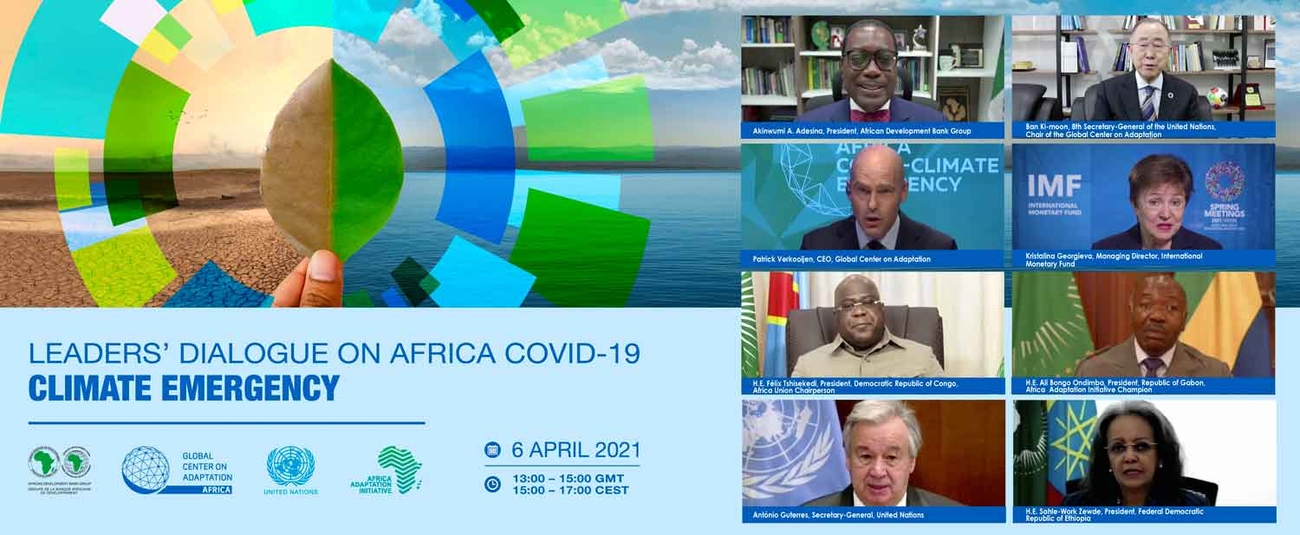
In a historic and united show of solidarity for a continent that contributes only 5% to global emissions, more than 30 heads of state and global leaders committed to prioritize actions that help African countries adapt to the impacts of climate change and “build forward better.”
Watch the Heads of State and global leaders remarks
Africa now faces the dual onslaught of climate change – currently estimated at between $7 billion and $15 billion each year – and Covid-19, which has claimed 114,000 lives. The African Development Bank expects that the impact of climate change on the continent could rise to $50 billion each year by 2040, with a further 3% decline each year in GDP by 2050.
Speaking Tuesday, during a virtual Leaders’ Dialogue convened by the African Development Bank, the Global Center on Adaptation and the Africa Adaptation Initiative, more than 30 heads of state and global leaders rallied behind the bold new Africa Adaptation Acceleration Program. The program’s objective is to mobilize $25 billion to accelerate climate change adaptation actions across Africa.
President Félix-Antoine Tshisekedi Tshilombo of the Democratic Republic of Congo, and African Union Chairperson, invited his fellow leaders to: “revisit our climate ambitions and accelerate the implementation of our actions planned under our national priorities. To do this we will need to focus on actions to adapt to the impacts of climate change, these include nature-based solutions, energy transition, enhanced transparency framework, technology transfer and climate finance.”
The Africa Adaptation Acceleration Program is built to address the impacts of Covid-19, climate change, and the continent’s worst recession in 25 years. This is why today’s unprecedented show of support for the financing of African adaptation is so significant.
According to Ban Ki-moon, the 8th Secretary-General of the United Nations and the Chair of the Global Center on Adaptation, “The Covid-19 pandemic is eroding recent progress in building climate resilience and leaving countries and communities more vulnerable to future shocks. Africa must make up for lost ground and lost time. Climate change did not stop because of Covid-19, and neither should the urgent task of preparing humanity to live with the multiple effects of a warming planet.”
President Ali Bongo Ondimba of Gabon, and Chair of the African Union-led Africa Adaptation Initiative, spoke of Gabon’s record in emission reductions. He said that Gabon is one of the few countries in the world that is carbon positive. “We have to insist that equal attention be paid to climate adaptation and mitigation in climate finance. Africa calls on the developed nations to shoulder the historic responsibility and to join the program to accelerate the adaptation in Africa,” President Bongo said.
African Development Bank President Dr. Akinwumi A. Adesina said: “With our partners, we intend to mobilize $25 billion in financing for the success of the Africa Adaptation Acceleration Program. It is time for developed countries to meet their promise of providing $100 billion annually for climate finance. And a greater share of this should go to climate adaptation. So far, more than 20 trillion dollars have gone into Covid-19 stimulus packages in developed countries. The International Monetary Fund’s plan to issue $650 billion of new Special Drawing Rights (SDRs) to boost global reserves and liquidity will be enormously helpful to support green growth and climate financing for economic recovery. I applaud the leadership of the US government and US Treasury Secretary Janet Yellen, especially, on this big push.”
UN Secretary-General António Guterres said: “African nations are showing leadership…The Africa Adaptation Acceleration Program, and many other ambitious African initiatives, must be empowered to fully deliver on their goals. “
Guterres added: “Universal access to energy in Africa, a priority in the coming years, could be provided primarily through renewable energy. I call for a comprehensive package of support to meet these dual objectives by COP 26. It is achievable, it is necessary, it is overdue, and it is smart.”
Speaking on behalf of US President Joseph R. Biden, US Treasury Secretary Janet Yellen said: “The United States remains a committed development partner for Africa and a huge supporter of the African Development Bank. Africa contributed the least to climate change but is suffering the worst of its effects. I congratulate the African Development Bank and the Global Center for Adaptation for developing the Africa Adaptation Acceleration Program. We support the program… to help ensure that together, we can avoid the worst effects of climate change.”
International Monetary Fund Managing Director Kristalina Georgieva(link is external) said: “As well as facing the health and economic crisis caused by the pandemic, countries in Africa are among the most vulnerable to the effects of climate change. Tackling this dual challenge requires putting adaptation at the heart of Africa’s recovery – so countries build resilience to climate change and spur economic activity. This pandemic has shown us the importance of investing in people. And that is so, so very valuable for Africa, which has a fast-growing young population. This begins by improving education, healthcare, and food security, and in that context, I warmly welcome the Africa Adaptation Acceleration Program.”
Speaking on behalf of French President Emmanuel Macron, the Chief Executive of the French Development Agency, Remy Rioux said: “Africa is providing solutions to climate change, including the Great Green Wall and the Desert to Power initiative of the African Development Bank to build the world’s largest solar zone in the Sahel of Africa. France fully supports the Africa Adaptation Acceleration Program.”
Moderating the Leaders’ Dialogue, Dr. Patrick Verkooijen, CEO of the Global Center on Adaptation, said: “Africa has a unique opportunity to advance its development exponentially if it invests now in a climate-smart adapted future based on a deep understanding of climate risks and solutions that put nature and people at the center.”
Read the Global Call to Action here
.embed-container { position: relative; padding-bottom: 56.25%; height: 0; overflow: hidden; max-width: 100%; } .embed-container iframe, .embed-container object, .embed-container embed { position: absolute; top: 0; left: 0; width: 100%; height: 100%; }
Leaders’ Dialogue on the Africa COVID-Climate Emergency – OPENING VIDEO
